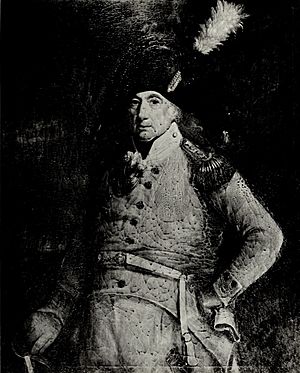Arent DePeyster facts for kids
Quick facts for kids
Arent de Peyster
|
|
|---|---|
 |
|
| Personal details | |
| Born |
Arent Schuyler de Peyster
27 June 1736 New York City, New York |
| Died | 26 November 1822 Dumfries, Scotland |
| Spouses |
Rebecca Blair
(m. 1757; |
| Relations | Abraham de Peyster (grandfather) Arent Schuyler (grandfather) Peter Schuyler (uncle) |
| Parents | Pierre Guillaume DePeyster Cornelia Schuyler |
| Military service | |
| Allegiance | |
| Branch/service | 50th Foot, 51st Foot, 8th Foot |
| Years of service | 1755–1794 |
| Rank | Colonel |
| Battles/wars | Seven Years' War American Revolution |
Arent Schuyler DePeyster (born June 27, 1736 – died November 26, 1822) was a British military officer. He was born in America but served the British Crown. He is most famous for leading British forces at Fort Michilimackinac and Fort Detroit. These forts were important during the American Revolution. After another leader, Henry Hamilton, was captured, DePeyster became a key military figure. He led British and Native American groups in the western parts of America and Canada.
Early Life and Family
Arent DePeyster was born in New York City. His parents were Pierre Guillaume DePeyster and Cornelia Schuyler. His family was well-known in New York. His grandfather, Abraham de Peyster, was the 20th Mayor of New York City. Another grandfather, Arent Schuyler, was also a notable figure.
Arent was educated in London, England. He joined the British Army as an ensign, which is a junior officer rank. This happened just in time for the Seven Years' War.
Military Career
DePeyster joined the British Army in 1755. He was part of the 50th Foot Regiment. This regiment was formed in America. Later, he joined the 51st Foot Regiment.
During the Seven Years' War, he served in upper colonial New York. He learned a lot about frontier warfare in America. He was captured and held as a prisoner in France for a time. After being exchanged, he finished the war serving with the 8th Regiment of Foot in Germany.
The 8th Regiment was later sent to Canada. DePeyster received several promotions during this time. In 1774, he became the commander of Fort Michilimackinac. This fort is in what is now Mackinaw, Michigan. DePeyster stayed at this fort for five years.
American Revolution
When the American Revolution began in 1775, DePeyster helped the British. He recruited Native Americans from the Great Lakes region to fight for the British Crown. He was rewarded for his efforts with a promotion to major.
In 1779, Major DePeyster took command of Detroit. At first, some Native American tribes in the Northwest Territory were against the British. However, DePeyster was a skilled leader. He used diplomacy and fair methods to win them over. He successfully managed his Native American allies against American forces from Pennsylvania and Kentucky. Even though Great Britain gave control of Detroit to the United States after the war, the British held it until 1796.
In November 1783, DePeyster was promoted to Lieutenant-Colonel. He was transferred to Fort Niagara. This fort was located where the Niagara River meets Lake Ontario. He took command there in June 1784. In the summer of 1785, after the war ended, he sailed back to England with his regiment. He continued to serve and became a full Colonel in 1793.
Later Life
DePeyster retired from the army in 1794 due to illness. He and his wife moved to Dumfries, Scotland. They settled at a country estate called Mavis Grove.
In 1795, England faced a threat from Napoleon. DePeyster became active in the local militia again. He played a big part in forming and training the 1st regiment of Dumfries volunteers. A famous Scottish poet, Robert Burns, was one of the original members of this group. Burns even dedicated a poem to DePeyster. DePeyster also published his own writings in 1813.
Personal Life
After the Seven Years' War, DePeyster was stationed in Scotland. There, he married Rebecca Blair in 1757. Rebecca was the daughter of Bryce Blair, who was the Provost (like a mayor) of Dumfries. They reportedly had a happy marriage and were rarely apart. They did not have any children.
Arent DePeyster died on November 26, 1822, in Dumfries, Scotland. His death was the result of an accident. He had a large funeral and was buried in St Michael's Churchyard. His wife, Rebecca, passed away a few years later in 1827.
 | Dorothy Vaughan |
 | Charles Henry Turner |
 | Hildrus Poindexter |
 | Henry Cecil McBay |

